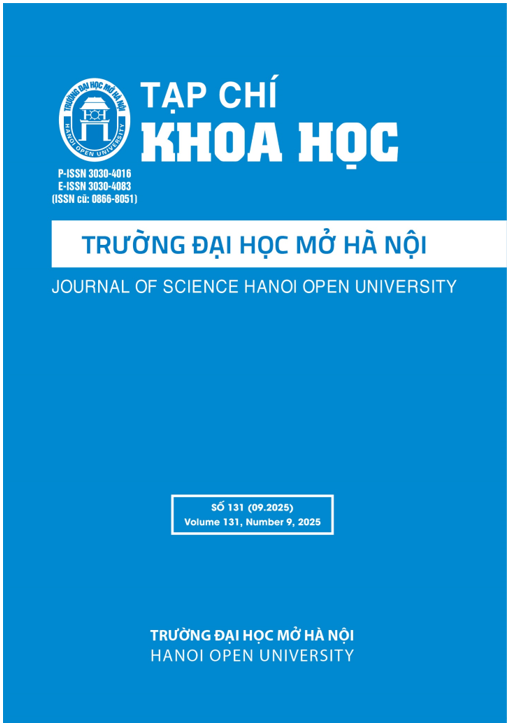RESEARCH MODELS RELATED TO PERSONAL PSYCHOLOGICAL FACTORS INFLUENCING STUDENTS' ENTREPRENEURIAL INTENTIONS
DOI:
https://doi.org/10.59266/houjs.2025.742Abstract
In the context of a dynamic digital economy and increasing advocacy for self-employment, identifying the psychological drivers behind students’ entrepreneurial intentions is both timely and essential. This study reviews and analyzes seven established research models that explore the personal psychological factors influencing entrepreneurial intent among university students. Drawing from both international theories and localized Vietnamese studies, the paper proposes the model by Nguyen et al. (2022) as the most appropriate framework for examining students’ entrepreneurial intention in the current context. The study highlights seven psychological factors, including entrepreneurial passion, personality traits, self-efficacy, desire for wealth, self-expectation, need for recognition, and need for autonomy.
References
[1]. Ajzen, I. (1991). The Theory of Planned Behavior. Organizational behavior and human decision processes 50(2):179- 211
[2]. Ajzen, I., & Fishbein, M. (2011). Attitudes and the attitude-behavior relation: Reasoned and automatic processes. European review of social psychology, 22(1), 1-31.
[3]. Alsos, G. A., & Kolvereid, L. (1998). The business gestation process of novice, serial, and parallel business founders. Entrepreneurship theory and practice, 22(4), 101-114.
[4]. An Nhi (2023). Viewpoints and objectives of rural tourism development in new rural construction. Economy and forecast review online. Retrieved from https://kinhtevadubao.vn/quan-diem-muc-tieu-phat-trien-du-lich-nong-thon-trong-xay-dung-nong-thon-moi-27331.html.
[5]. Bandura, A. (1986). Social foundations of thought and action: A social cognitive theory. PrenticeHall.
[6]. Bird, B. J. (1988). Implementing entrepreneurial ideas: The case for intention. Academy of Management Review, 13(3), 442-453.
[7]. Bui, H. T. D., Le, L. T., Dao, D. T. X., & Nguyen, H. T. (2011). Impact of personal characteristics on students’ entrepreneurial potential. Science and Technology Development Journal, 14(3), 68-82.
[8]. Claudio, L., Vincenzo, G., Luigi, M., Agostino, G., & Alfonso, S. (2017). Exploring the features of agritourism and its contribution to rural development in Italy. Land Use Policy, 64, 383-390.
[9]. Driessen, M., & Zwart, P. S. (2006). The Entrepreneur scan measuring characteristics and traits of entrepreneurs (De E-Scan Ondememerstest ter beoordelling van ondernemerschap). Maandblad voor Accountancy en Bedrijfseconomie, juli/ augustus 2006, 382-391.
[10]. Ghasemi, F., Rastegar, A., Jahromi, R. G., & Marvdashti, R. R. (2011). The relationship between creativity and achievement motivation with high school students’ entrepreneurship. Procedia - Social and Behavioral Sciences, 30, 2011, 1291-1296.
[11]. Gupta, V. K., & Bhawe, N. M. (2007). The influence of proactive personality and stereotype threat on women’s entrepreneurial intentions. Journal of Leadership & Organizational Studies, 13(4), 73-85.
[12]. Ha Giang Union of Science and Technology Associations. (2023). Proceedings of the Workshop on Developing High-Quality Agricultural Tourism Products, Promoting Sustainable Economic Development.
[13]. Karabulut, A. T. (2016). Personality Traits on Entrepreneurial Intention. Procedia - Social and Behavioral Sciences. Volume 229, 19 August 2016,
-21.
[14]. Koe, W. L., Sa’ari, J. R., Majid, I. A., & Ismail, K. (2012). Determinants of entrepreneurial intention among millennial generation. Procedia - Social and Behavioral Sciences, 40, 197-208. https://doi.org/10.1016/j. sbspro.2012.03.18.
[15]. Krueger, N. F., Reilly, M. D., & Carsrud, A. L. (2000). Competing models of entrepreneurial intentions. Journal of Business Venturing, 15(5-6), 411-432.
[16]. Liñán, F., & Chen, Y. W. (2009). Development and cross-cultural application of a specific instrument to measure entrepreneurial intentions. Entrepreneurship Theory and Practice, 33(3):593 - 617
[17]. Luong, N. M. (2019). Research on factors affecting the entrepreneurial spirit of students in Hanoi (Doctoral dissertation, National Economics University).
[18]. Luthje, N., & Franke, C. (2004). Entrepreneurial intentions of business students - A benchmarking study. International Journal of Innovation and Technology Management (IJITM), 1(3), 269-288.
[19]. National Statistics Office (2023). Socio- economic situation in the fourth quarter of 2023. https://www.nso.gov.vn/en/ data-and-statistics/2024/02/socio- economic-situation-in-the-fourth- quarter-and-2023. Accessed 1/2025.
[20]. Nga, J. K. H., & Shamuganathan, G. (2010). The influence of personality traits and demographic factors on social entrepreneurship start-up intentions. Journal of Business Ethics, 95(2), 259-282.
[21]. Nguyen, M. H. (2023). Vietnamese youth tend to prefer being their own boss rather than working as employees. Financial investment - A Special section of Sai Gon giai phong online.
[22]. Nguyen, T. K. N. (2023). Solutions for developing “agricultural tourism” in the context of digital transformation in Can Tho city. Industry and Trade Magazine
- Results of Scientific Research and Technology Application, (6), March 2023.
[23]. Nguyen, T. H. N., Dinh, T. M., & Vu, T. N. (2022). Factors affecting the entrepreneurial intention of students at the University of Commerce (Scientific research report).
[24]. Nguyen, X. T. (2007). General Psychology Textbook. University of Education Publishing House.
[25]. Nordin, N., Siti-Nabiha, A. K., & Kamalia, Z. (2019). Microfinancing influence on micro-entrepreneurs’ business growth: Mediating role of psychological and social capital. Journal of Entrepreneurship, Business and Economics, 7(2), 130-161.
[26]. Phan, A. T., & Tran, Q. H. (2017). Analysis of factors affecting the intention to start a business of students at Can Tho University of Technology. Can Tho University Journal of Science, (48), 96-103.
[27]. Prime Minister. (2022). National target program on new rural construction for the period 2021-2025 (Decision No. 263/QĐ-TTg, February 22, 2022).
[28]. Schwarz, E. J., Wdowiak, M. A., AlmerJ., M., & Breitenecker, R. J. (2009). The effects of attitudes and perceived environment conditions on students’ entrepreneurial intent: An Austrian perspective. Education + Training, 51(4), 272-291.
[29]. Shane, S., Locke, E. A., & Collins, C. J. (2003). Entrepreneurial Motivation. Human Resource Management Review, 13(2), 257-279.
[30]. Shapero, A., & Sokol, L. (1982). The social dimensions of entrepreneurship. In C. A. Kent, D. L. Sexton, & K. H. Vesper (Eds.), Encyclopedia of entrepreneurship (pp. 72-90). Englewood Cliffs, NJ: Prentice-Hall.
[31]. Souitaris, V., Zerbinati, S., & Al- Laham, A. (2007). Do entrepreneurship programmes raise entrepreneurial intention of science and engineering students? The effect of learning, inspiration, and resources. Journal of Business Venturing, 22(4), 566-591
[32]. Wang, Q., Lai, X., Zheng, F., Yu, T., Wang, L., Wu, Y., Wang, K., Zhang, X., Zhou, Q., & Tan, L. (2022). The impacts of self-expectation leadership and organizational commitment on hand hygiene behavior of medical staff based on the theory of implicit leadership. Frontiers in Psychology, 13, doi: 10.3389/fpsyg.2022.992920.
